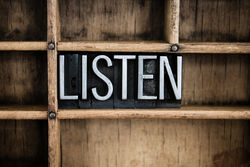Deep Listening
By Kaspa Thompson
A few days ago I drove home from my teacher’s old farmhouse in the centre of France. Twelve hours of travelling through sleepy rural villages, on motorways cutting through huge golden wheat fields, before the ferry back to Dover, and the feelings in the UK around Brexit.
I had been on retreat, a regular fixture of my summer. The group there had spent ten days watching coal-tits and swallows, flitting from the house to the barn, to the walnut tree; practicing Buddhism together; attending talks by our teacher; moaning about the mosquitoes and deer flies; and deeply listening to each other’s stories. It was that deep listening which brought the group into harmony, and allowed us to be at ease with ourselves and each other.
Deep listening to people is part of my life now: it’s part of my work both as a therapist and a priest, and, I hope, happens in my personal relationships too. However it wasn’t something that I always knew how to do.
Often when we are listening we are not really paying attention to what the other person is saying, but doing a whole host of other things instead. We might just be listening out for the something that relates to us, so that we can say ‘me too’, or share our own story – cutting into the conversation regardless. We might have already made up our mind about what’s been spoken about, and then just hear what agrees with what we already think. Sometimes people will say to me, "I followed your advice and did so and so", and I think "I never suggested anything of the sort". We hear what we expect to hear.
If our minds are rigid, or full of our own ideas, how can we expect to learn anything new?
Once, during the Meji era of Japan, a professor of Buddhism went to visit Nan-in, a great Zen master. They greeted each other, sat down, and Nan-in served tea in the elaborate Japanese way. The professor talked and talked, filling the room with his own ideas. Nan-in poured tea into the professor’s cup, and kept pouring. The cup filled, and he kept pouring. The tea spilled over the rim.
"What are you doing?" the professor asked, "It’s full up – no more will go in."
"The cup is just like you" Nan-in replied, "how do you expect to learn anything when you are so full of your own ideas?"
If we are the person being heard, having someone deeply listen to us brings a sense of being understood, a sense of deep connection, and the space we are given allows us to work things for out for ourselves.
If we are the person deeply listening, we are able to come closer to what is really true, move towards a state of being at ease with difference, and work towards ways of living together that are good for everyone.
Over the past few weeks, with conversations around the E.U. referendum, I have seen high feelings and failures to listen to each other. I have seen friendships strained, and arguments in real life and online.
At times like this, when we are feeling stirred up, or around others who are stirred up, it is even more important to engage in deep listening. Who is this person in front of me, really? What are their hopes? What insecurities lie underneath their strong feelings? It is a cliché to say ‘walk a mile in someone else’s shoes’ but how often do we really do this?
Deep listening doesn’t mean we always agree with each other– it simply means having a more spacious kind of conversation.
If we make space for understanding the other, rather than being a ‘too full cup of tea’, we can begin to build a sense community, and to move forwards together.
Kaspa Thompson is a psychotherapist, mindfulness teacher and Buddhist priest. For info on therapy and mindfulness classes see: www.kaspathompson.co.uk and for his local Buddhist group see:


